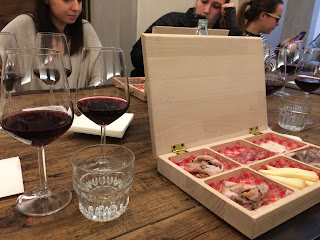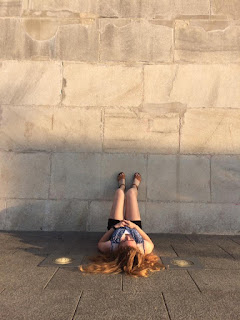How I Got Goals Wrong
As I mentioned in my first blog post of the year, I don't really do the resolution thing. To be honest, I haven't really done the whole goal thing. My rationale was that goals are usually overly ambitious resulting in them not being met, and if I want something enough, I'll do it without needing to really articulate it. But, every spring I find myself writing a big goal list for the upcoming summer. It usually features things like "read x books," "finish project y that I started a year ago," and "exercise z times per week," for example. And, every year, I'd meet maybe half of these goals, further providing evidence to myself that goal-setting doesn't work for me.
But recently, I had a light bulb moment. It isn't that goal-setting doesn't work for me - I just haven't been doing it right. It took 3 rounds of me being exposed to the right approach for it to click. So, what needed fixing? Recognizing goals and objectives are distinct and most effective when used together. Wow, amazing right? I know it sounds simple, but bear with me.
Goals are those "reaches." Essentially, all goals are "end goals." Objectives are those smaller, precise statements of what can be done to reach these goals. When crafted well, they'll be specific, measurable, achievable, relevant to the goal, and have a time frame. This is called a SMART objective (s/o to my "mini behavioral science" course). So, these are meant to be touch-points to make sure you're on track to reach your goal. My mistake was mixing these two concepts together. Either I did not articulate why I wanted to do the things I listed (creating objectives without goals), or I didn't have any concrete things to work toward (creating goals without objectives).
Articulating both goals and objectives together might sound regimented for those of us who are more Type B than Type A, but embracing this is actually pretty freeing. When this clicked for me, making those Big Goals didn't feel overly aspirational anymore. I am free to say I want these seemingly out-of-reach things because I can lay out the steps to get there. Of course, I'll need help along the way to stick with it, but feeling able to do something is a big part of then accomplishing that thing.
So, now you might be wondering how exactly this format might look. Well, I can demonstrate with a goal of my own: to really know wine. It was fascinating to me when I went abroad and have been wanting to expand on the knowledge I gained in Italy ever since, so now it's a goal. I have a wine atlas I picked up at a book sale that I'm reading weekly; buying a new bottle inspired by that atlas each month, keeping track of my thoughts about it; and plan on joining a wine club within the first year of my "real job." Each of my objectives have a temporal component, are specific and reasonable (I'm not expecting myself to start my own vineyard in 3 months), and definitely are relevant to my goal. To keep track of whether I'm meeting my objectives, I use an app called Habitica (previously called Habit RPG). I would describe it in more detail here, that would make this post a bit too long. Just follow the link ;) Another option for those of you who like bullet journaling is to keep track of your progress or document fall outs (and why they happened) there.
Now, with all of this, I want to also give a related pep-talk. If you don't reach an objective along the way, that doesn't mean you won't reach your goal. It just means it's time to take a step back and evaluate what can be done better. Maybe the content of the objective is good, but the time frame should be extended. Maybe doing something 100% perfectly is asking too much, and aiming for 80% completion is more realistic. Maybe a different objective in a similar vein would be better than the one you had been working on, so a switch should happen. In every situation, it isn't as much of a failure as it is a course correction since what you are ultimately working toward is still attainable. If you seem to keep hitting these roadblocks, get someone else involved to work on this with you. That might mean they're just an accountability partner that checks in regularly or someone who has the same goals and agrees to the same objectives. It might also help to get another set of eyes on them in case you don't notice your objectives might not be realistic or you need a different set of ideas to reframe something to make it more enjoyable and impactful. Even if you never quite seem to reach that ideal you initially set out to achieve, along the way you probably have gotten closer to it than when you started. That isn't failure. That is an accomplishment, even if it's not as "big" as you'd rather it be. Now, go out there and give this whole thing a try. You've got this.
But recently, I had a light bulb moment. It isn't that goal-setting doesn't work for me - I just haven't been doing it right. It took 3 rounds of me being exposed to the right approach for it to click. So, what needed fixing? Recognizing goals and objectives are distinct and most effective when used together. Wow, amazing right? I know it sounds simple, but bear with me.
Goals are those "reaches." Essentially, all goals are "end goals." Objectives are those smaller, precise statements of what can be done to reach these goals. When crafted well, they'll be specific, measurable, achievable, relevant to the goal, and have a time frame. This is called a SMART objective (s/o to my "mini behavioral science" course). So, these are meant to be touch-points to make sure you're on track to reach your goal. My mistake was mixing these two concepts together. Either I did not articulate why I wanted to do the things I listed (creating objectives without goals), or I didn't have any concrete things to work toward (creating goals without objectives).
Articulating both goals and objectives together might sound regimented for those of us who are more Type B than Type A, but embracing this is actually pretty freeing. When this clicked for me, making those Big Goals didn't feel overly aspirational anymore. I am free to say I want these seemingly out-of-reach things because I can lay out the steps to get there. Of course, I'll need help along the way to stick with it, but feeling able to do something is a big part of then accomplishing that thing.
So, now you might be wondering how exactly this format might look. Well, I can demonstrate with a goal of my own: to really know wine. It was fascinating to me when I went abroad and have been wanting to expand on the knowledge I gained in Italy ever since, so now it's a goal. I have a wine atlas I picked up at a book sale that I'm reading weekly; buying a new bottle inspired by that atlas each month, keeping track of my thoughts about it; and plan on joining a wine club within the first year of my "real job." Each of my objectives have a temporal component, are specific and reasonable (I'm not expecting myself to start my own vineyard in 3 months), and definitely are relevant to my goal. To keep track of whether I'm meeting my objectives, I use an app called Habitica (previously called Habit RPG). I would describe it in more detail here, that would make this post a bit too long. Just follow the link ;) Another option for those of you who like bullet journaling is to keep track of your progress or document fall outs (and why they happened) there.
Now, with all of this, I want to also give a related pep-talk. If you don't reach an objective along the way, that doesn't mean you won't reach your goal. It just means it's time to take a step back and evaluate what can be done better. Maybe the content of the objective is good, but the time frame should be extended. Maybe doing something 100% perfectly is asking too much, and aiming for 80% completion is more realistic. Maybe a different objective in a similar vein would be better than the one you had been working on, so a switch should happen. In every situation, it isn't as much of a failure as it is a course correction since what you are ultimately working toward is still attainable. If you seem to keep hitting these roadblocks, get someone else involved to work on this with you. That might mean they're just an accountability partner that checks in regularly or someone who has the same goals and agrees to the same objectives. It might also help to get another set of eyes on them in case you don't notice your objectives might not be realistic or you need a different set of ideas to reframe something to make it more enjoyable and impactful. Even if you never quite seem to reach that ideal you initially set out to achieve, along the way you probably have gotten closer to it than when you started. That isn't failure. That is an accomplishment, even if it's not as "big" as you'd rather it be. Now, go out there and give this whole thing a try. You've got this.




Comments
Post a Comment